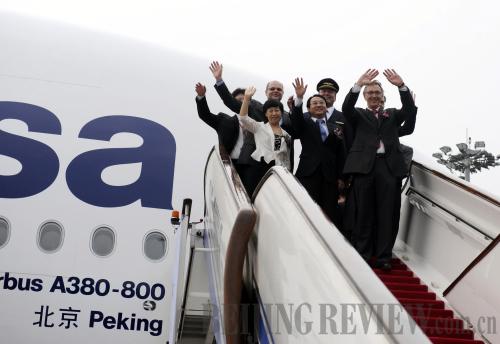|
 |
|
AIR LINK: CEO of Germany's Lufthansa AG Wolfgang Mayrhuber (front) waves after arriving at the Beijing Capital International Airport on the first Airbus A380 flight between Beijing and Frankfurt on September 2 (XINHUA) |
Chinese State Councilor Dai Bingguo and Catherine Ashton, Vice President of the European Council and EU High Representative for Foreign Affairs and Security Policy, co-chaired the first upgraded China-EU strategic dialogue in Guiyang, capital of southwest China's Guizhou Province, on September 1.
The dialogue was formerly held between vice foreign ministers of China and countries holding the EU's rotating presidency.
This upgrade shows the importance the two sides attach to the talks, and reveals their expectations to increase consensus through deepened understanding.
Economic factor
Surging economic and trade cooperation has gained strategic significance in China-EU relations. In 2004, the EU became China's biggest trading partner. In 2006, it replaced the United States as China's biggest export market. It became the biggest source of China's imports in 2009. In addition, the EU is China's biggest technology supplier and fourth largest foreign investor.
In 2008, the year the global financial crisis broke out, China-EU trade volume hit $425.58 billion, up 19.5 percent from the previous year. In 2009, as the crisis deepened, the EU and the euro zone experienced an economic recession. The total GDP of the 27 EU states dropped 4.1 percent, while that of the 16 euro-zone states fell 4.2 percent. As a result, both trade and investment between China and the EU declined, with bilateral trade volume decreasing to $364.1 billion.
Despite a sluggish European economy, the China-EU trade volume in the first half of this year, driven by rapid Chinese economic growth, recovered quickly and exceeded $210 billion. That is up 37 percent from the same period one year ago.
Due to the heavy blow of the global financial crisis and a European financial market panic caused by the Greek sovereign debt crisis early this year, the European economy is still fragile, despite a moderate expansion.
On September 2, the European Central Bank raised its estimate for euro-zone growth in 2010 to 1.4-1.8 percent and in 2011 to 0.5-2.3 percent. Meanwhile, it decided to keep the benchmark interest rate at 1 percent for the 16th consecutive month. The bank also announced it would continue with unlimited lending until the end of the year.
The European economy has shown signs of recovery thanks to the EU's bailout measures. But it is still subject to uncertainties in the external economic environment and the European labor market. In July, the unemployment rate in the euro zone reached nearly 10 percent. This is evidence that the European economy has yet to fully recover from the crisis.
In this context, it is important for the EU to explore new possibilities to expand its trade with and investment in China, so as to ensure a smooth economic recovery. This was an important aspect of the China-EU strategic dialogue.
Mutual understanding
With its sustained growth momentum, China will continue to be a major export market and trading partner of the EU. Ashton is concerned about the EU's trade with China, especially exports. She said that, despite the recent increase in China-EU trade, the EU's total exports to China last year were lower than to Switzerland, a small country that is not a member of the EU.
The EU is also concerned about European companies' market access in China, especially in terms of government procurement and the service sector, including the financial industry and insurance.
Meanwhile, China is making great efforts to adjust its economic structure and expand domestic demand. A realization of this will mean reduced reliance on exports. But this does not mean China is willing to see the EU take protectionist measures to guard its own markets because of its slow growth, high unemployment and sluggish domestic demand.
| 